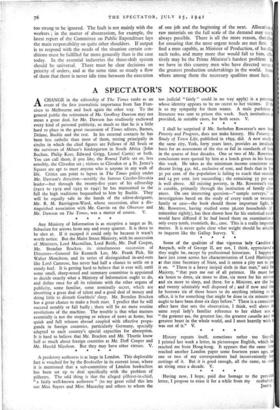A SPECTATOR'S NOTEBOOK
ACHANGE in the editorship of The Times ranks as an event of the first journalistic importance from San Fran- cisco to Melbourne and back again the other way. To the general public the retirement of Mr. Geoffrey Dawson may not mean a great deal, for Mr. Dawson has studiously eschewed every kind of personal publicity, so much so that he is a little hard to place in the great succession of Times editors, Barnes, Delane, Buckle and the rest. In his external contacts he has been less catholic than most of them, mixing principally in circles in which the chief figures are Fellows of All Souls or the survivors of Miler's kindergarten in South Africa (John Buchan, Philip Kerr, Edward Grigg, Lionel Curtis) or both. You can call them, if you like, the Round Table set or, less sensibly, the Cliveden set ; visitors to aiveden or 4 St. James's Square are apt to meet anyone who is anyone in any walk of life. Critics can point to lapses in The Times policy under Mr. Dawson's direction—notably the famous Czecho-Slovakia leader—but through the twenty-five years of his editorship (1912 to 1919 and 1923 to 1941) he has maintained to the full the high traditions bequeathed to him by Buckle. They will be equally safe in the hands of the editor-designate, Mr. R. M. Barrington-Ward, whose succession, after a dis- tinguished association with Mr. Garvin on the Observer and Mr. Dawson on The Times, was a matter of course. V.


























 Previous page
Previous page